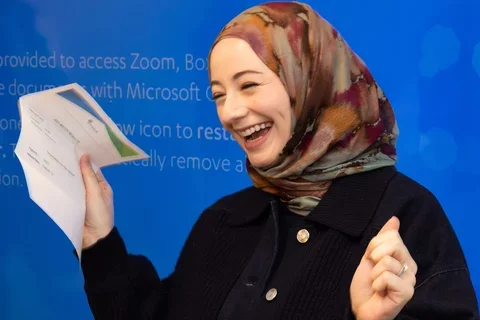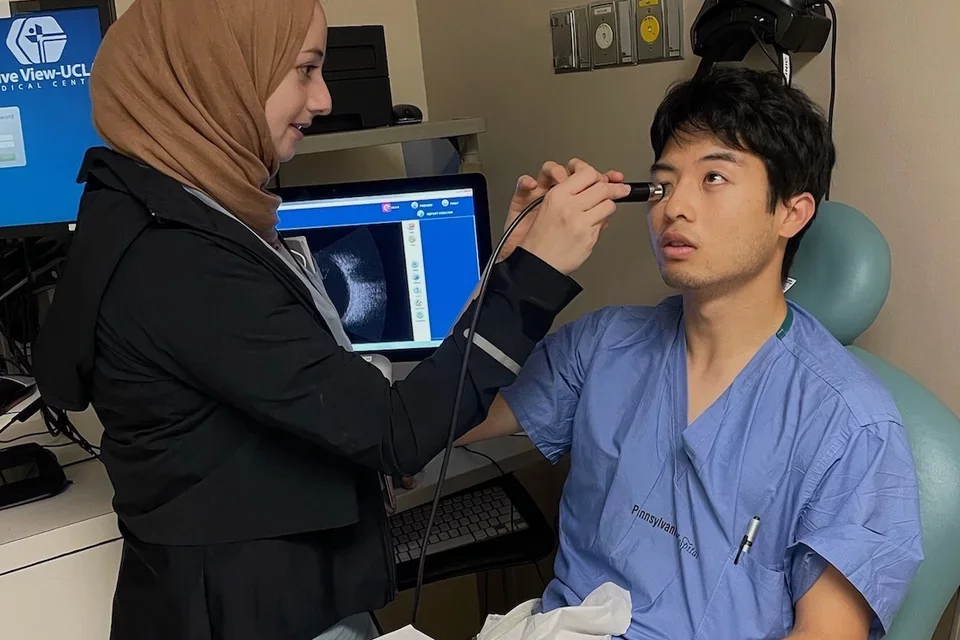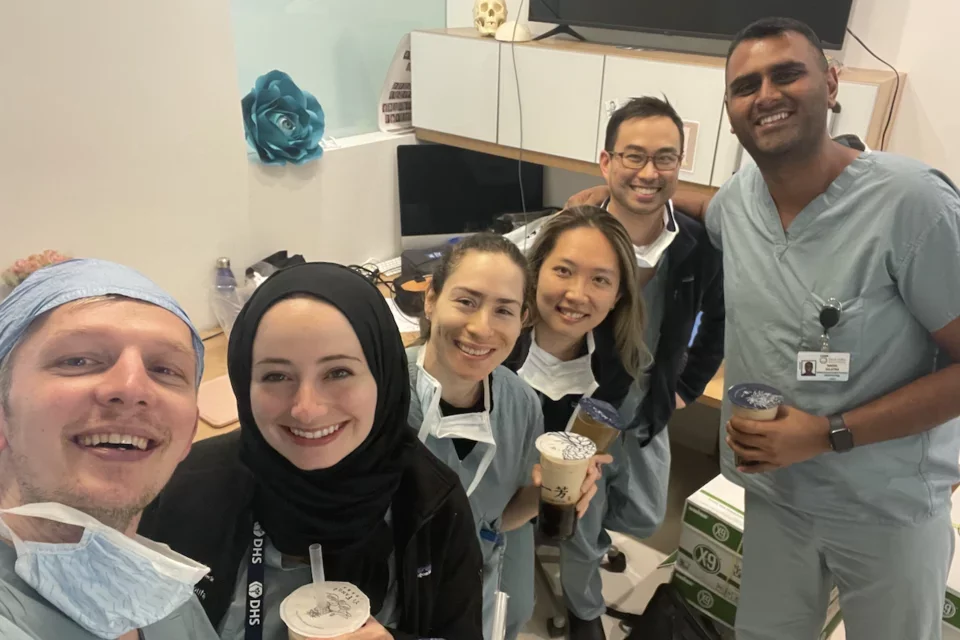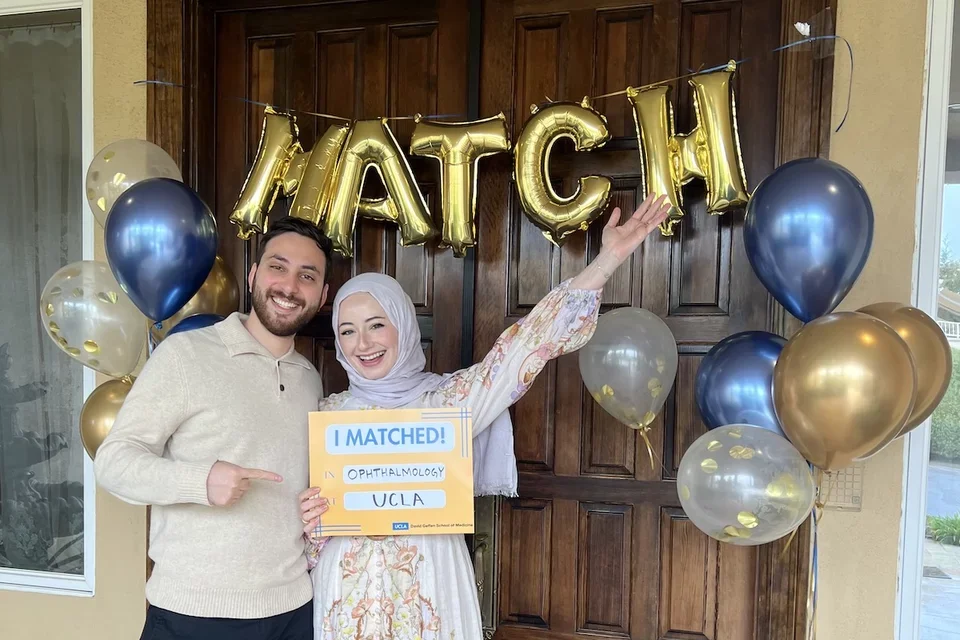Matching Into Residency: Reem Karmouta’s Story
Student Spotlight

Meet Reem Karmouta
- Specialty: Ophthalmology
- Matched residency program: UCLA
- Fun fact: Reem is deeply passionate about traveling. She visited many wonderful places, including French Polynesia, Turkey, Spain, and Italy—all during her busy medical school years.
Reem Karmouta is a proud Muslim, Syrian American woman. Her parents raised her in Orange County, California, where they settled after emigrating from Aleppo, Syria.
Growing up in California, Reem met people from many different places, with many different backgrounds. However, she rarely encountered anyone who looked exactly like her, particularly in the field of medicine.
She long imagined herself pursuing a career in healthcare, but the idea of becoming a doctor never crossed her mind. It just didn’t seem like an option for her.
Reem recalls the moment everything changed—when she met a physician who wore a hijab, like she did.
Seeing herself represented in a doctor empowered Reem to believe she could have her own space in medicine. Her mental block dissolved, Reem could finally recognize and embrace the passion she felt about becoming a doctor.
“I realized there’s room in medicine for me, even if I look a little different or if my background is a little different,” she says. “I realized my differences could even be celebrated.”
A Passion Rooted in Humanism
Shadowing physicians, especially watching them interact with patients, helped Reem better understand the humanistic roots of her newly uncovered passion for healing.
“I realized it was an honor and a privilege to be a support system for patients in vulnerable situations, sometimes even the worst days of their lives,” she says. “I couldn’t wait to be that for my own patients.”
Reem found a home for pursuing her scientific education at the University of California, Los Angeles (UCLA). After earning her bachelor’s degree in Human Biology and Society, Reem stayed “home” for medical school.
At the David Geffen School of Medicine at UCLA (DGSOM), Reem connected with a specialty that would fulfill her humanistic passions and keep her technically challenged.
“I feel like I found my home and my people in ophthalmology.”
She found every ophthalmologist she met—including some of her research and career mentors, Irena Tsui, MD and Monica R. Khitri, MD—to be incredibly intelligent, skilled, and compassionate.
Ophthalmologists help patients through vulnerable and uncertain times not only by providing treatments and surgical interventions, but also by offering emotional support.
“The field blends the challenges of surgery with the rewards of supporting patients when they’re facing possible vision loss—when they’re most in need of support.”

A Day in the Life of a Med Student: Applying to Residency Programs
Reem entered her third year of medical school knowing she wanted to become an ophthalmologist and anticipating her next steps toward that goal: matching into an ophthalmology residency program.
The process involves applying to programs of interest, completing interviews with select sites, and submitting a final, prioritized list of programs. Aspiring ophthalmology residents apply though the San Francisco Matching Program (SF Match), which then processes medical students’ lists of programs along with the programs’ lists of medical students to find optimal matches.
On what’s widely known as “Match Day,” medical students find out their results. On Match Day, med students learn for the first time where they’ll be going for residency.
Unlike most of her colleagues, who participate in the National Residency Matching Program (NRMP)® and celebrate Match Day on March 15, Reem found out her match results through the SF Match early, on February 6.
Like many medical students, Reem felt nervous about the entire process. Knowing ophthalmology to be a competitive specialty compounded her jitters. Fortunately, a strong DGSOM support system got her through all the stress of applying to residency.
“During the third year of medical school, DGSOM connected us with a whole team of people to help us throughout the match process,” she says.
Reem wants first- or second-year medical students already feeling anxious about matching to know they’ll never be alone. An experienced team will be there, guiding them every step of the way.
“They’re not just aiming to help you match,” she adds. “They also want to help you become the kind of physician you want to be.”

Advice on Matching into Residency
Everyone’s support and knowledgeable advice eased Reem’s stress and uncertainty. They advised her to think of matching into residency as the home stretch. She should feel proud of the hard work she’d already put in to arrive at this pivotal moment. Matching was her chance to shine—to show the programs who she was. It was also her chance to identify the program most aligned with her values and goals.
Lee T. Miller, MD, Associate Dean for Student Affairs, helped Reem navigate an additional layer of complexity in her match situation. She hoped to end up in the same place as her husband, who was applying to cardiology fellowships. (They’d been living apart for the years he was in residency and she was in medical school.)
“Dr. Miller helped me make big decisions throughout the process, and he was always so available to me, just an email or a phone call away,” Reem says. “Having someone in my corner who had so much experience made the process a lot easier and a lot less stressful.”
After medical students submit their ranked program lists and complete their interviews, their role in the match process becomes passive. They wait, as patiently as possible, to learn their match results.
Reem kept busy, finishing her clinical rotations. She kept calm by reminding herself that the program she matched into would lead her down the path she was meant to be on. Things may not always work out exactly according to plan, but they can always work out.

Celebrating an Early Match Day
The match results for ophthalmology residency programs come out in February, earlier than most other specialties. The results also come out early in the morning, at 5 AM.
Reem and her family had their own intimate Match Day celebration. After spending the previous night putting up decorations, they all woke up early to hear Reem’s results.
“Opening the email with my results felt surreal,” Reem recalls. “It’s the moment I’d been waiting for all of medical school.”
Her long wait ended in absolute joy.
“To match with UCLA, my first choice, feels like such an honor,” she says, adding that she’d dreamed of staying at her undergraduate and medical school alma mater for residency since completing her ophthalmology rotations.

“I’m so happy I’ll get to experience UCLA as a resident and learn from all the wonderful people who ignited my interest in ophthalmology. I can’t imagine embarking on this new chapter in my life in a more supportive environment.”
Reem and her loved ones spent the rest of the day—after going back to bed for just a few hours—celebrating and basking in the good news. Reem simply wanted to share the day with everyone who’d been supporting her throughout her entire journey.
Reem and her family weren’t the only ones celebrating her match at UCLA.
“Reem is an absolute superstar. It has been a joy to get to know her well,” says Dr. Miller, who guided Reem throughout her match process. “She was an exceptionally competitive applicant, and I knew there would be one very lucky program to have her among their ranks. What a gift to us that she’s staying here at UCLA.”
Reem’s UCLA match gave her plenty to celebrate educationally, professionally, and also personally. She and her husband, who matched at the nearby University of Southern California (USC) for his cardiology fellowship, will soon be reunited, and not just for a visit.
“We’re going to be living in the same city and pursuing our dreams,” Reem says. “It’s more than I could ever ask for.”



